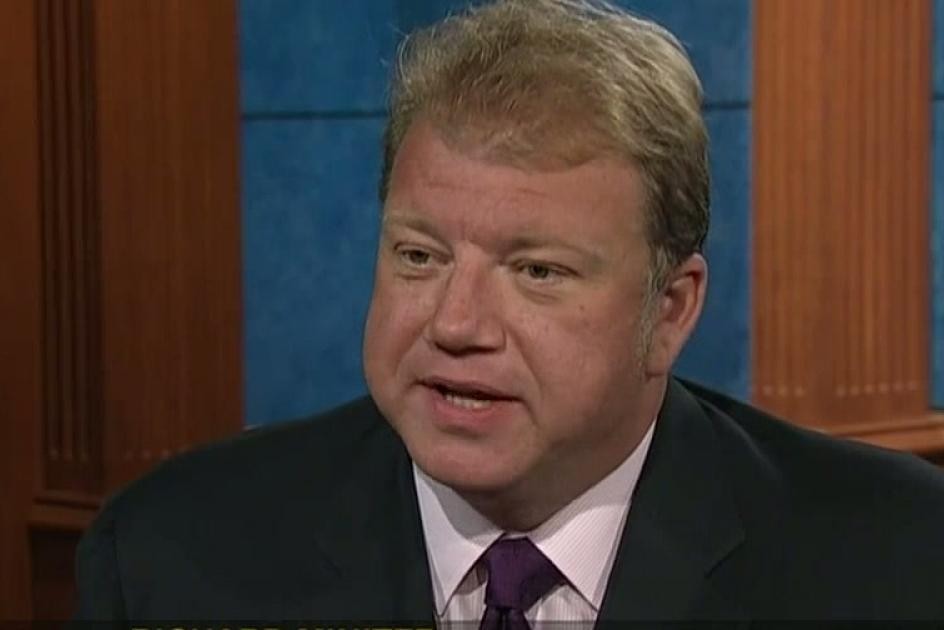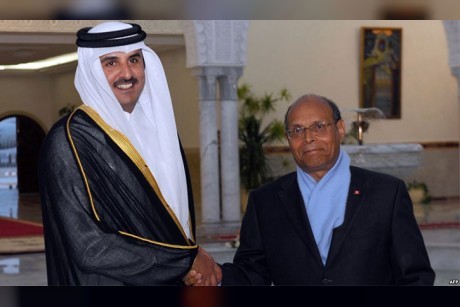Qatar, a gas-rich peninsula in the Arabian Gulf, is technically a U.S. ally. If America has many more allies like this one, it could lose the war on terror—opening up our homeland to attacks from extremists as in the days before September 11.
American diplomats and generals tend to see the Gulf states as more or less interchangeable. They see new skyscrapers winking in the sun, luxury cars parked beneath phalanxes of palms, and the designer boarding lounges that put the airports in New York and Los Angeles to shame. But, beneath the patina of wealth, are real differences among the Gulf states. In fact, there is a seething rivalry that will determine whether Americans can be kept safe abroad or at home.
The pivotal dispute pits Qatar against all five of its pro-American neighbors (Bahrain, Egypt, Kuwait, Saudi Arabia, and UAE). Senior levels of the State and Defense departments see it as a squabble among friends – something akin to France and Germany arguing over NATO spending priorities. As a result, The Trump Administration has temporized and refused to take a side. That paralysis could prove to be costly.
Qatar is home to a U.S. airbase from which its planes and drones strike terror targets in Afghanistan, Iraq and now Syria . But Qatar also sponsors many of the extremists that America bombs. The government has publicly boasted of funneling nearly $1 billion over the past decade to Hamas, a Palestinian group that has officially designated as “terrorist” by Israel, the European Union and the United States.
In addition, Qatar shelters key members of the Muslim Brotherhood – the gateway organization for nearly every violent Islamic terrorist organization in the world today – and many of its leaders; the Brotherhood. Khalid Shaikh Mohammed, the planner of the September 11 attacks, who Qatar funded with a no-show government job in 1996, was a member of the Brotherhood’s youth wing in Kuwait in the 1980s. There are many more such examples. No wonder, the now-retired General Wald, who opened the U.S. airbase in Qatar, is publicly calling for its closure.
Qatar’s neighbor in the Gulf, the United Arab Emirates, is equally rich but wholly different in its relationship with the United States. The UAE, which has banned the Muslim Brotherhood within its borders and put some of its leaders on trial, is a stalwart ally in the war on terror.
Qatar’s pro-American neighbors shut their air and sea ports to traffic with Qatar, blocked its trade, and recalled their ambassadors last year. Since then, the diplomatic freeze has only deepened. These five nations have demanded that Qatar cease its support for violent extremism and stop “normalizing” terrorists by giving them a platform on its state-run Al Jazeera networks. Qatar has refused and has increased its trade and diplomatic contacts with Iran, the world’s largest state sponsor of terrorism, and Turkey, an American ally that has turned its back on Israel and cracked down on domestic secularists.
The battleground among America’s Arab allies is now shifting to Africa. Qatar has long funded tribal leaders in Darfur to maintain the peace in that western region of Sudan. It has apparently warned Sudan’s leader that it will withdraw its funding – almost certainly bringing back a genocidal tribal war that captivated the world in 2003 – if he does not stick by Qatar’s side in its struggle with Egypt, Saudi Arabia and others. Sudan, which is anxious to improve its image in the west and present itself as a terror fighter, is caught between its desire to rehabilitate its image and its aim to prevent broad human rights abuses in its vast territory.
Somalia is an even more dramatic case. That Red Sea republic is locked into a deadly duel with al Shabaab, an al Qaeda affiliate.
For years, the effort was successful. Khalifa bin Zayed Al Nahyan, the UAE’s president, agreed to supply military and police counter-terrorism trainers to Somalia, along with arms, equipment and funding. It was a massive effort. And, it worked. Alongside U.S. and British special forces teams, the UAE-trained Somali forces turned back the al Qaeda remnants in 2014 and have largely held them at bay ever since.
To dry up the support for Islamic militants, the UAE also built schools, hospitals and orphanages and poured in developmental assistance valued at more than $277 million from 1993 to 2016, mainly through the Emirati Red Crescent Society. Another $165 million was supplied through a charitable campaign called “For you, Somalia,” in 2017. All told, charity and aid grants by UAE to Somalia came to almost half a billion dollars.
Now, under pressure from Qatar, Somalia has renounced UAE assistance.
Meanwhile, Qatar was also funneling men and money into Somalia, but with a different agenda. Some of its funds are believed by Western intelligence agencies to have gone to al Shabaab itself or its related faux charities. Other funds went to high-ranking government officials, including Somali President Mohammed Abdullahi “Farmajo” Mohamed.
Qatar soon used its muscle to interrupt a UAE-led development project, the creation of a modern, mechanized port at Berbera – operated by Dubai Ports World – in a new free-economic zone. The open port was designed to be a regional hub that moved raw materials from the inland of Africa to the wider world while lowering costs of importing computers, farm equipment and other machinery needed to modernize East African economies.
Since the free-port agreement is with a Somali regional government, the national government – egged on by Qatar – attempted to block the agreement and then refused to acknowledge its legitimacy. So much for rescuing Africans from both poverty and the claws of al Qaeda.
Recently Somalia’s leader, “Farmajo”, apparently violated international law by stopping a UAE aircraft on April 8, 2018 at Mogadishu International Airport. On board were UAE military trainers, who had come to Somalia to help fight terrorism. Somalia officials also seized funds destined to pay the salaries of Somali soldiers and trainees, as well as number of poor families and doctors of Zayed Hospital in Mogadishu.
Under a long-standing agreement, the UAE pays the salaries of 2,407 Somali soldiers, and operates three counter-terrorism training centers in that country. (This arrangement is not as exotic as it seems; the U.S. and EU have similar arrangements in other parts of the world.) The UAE trains and funds the Puntland Police Force’s anti-terrorism and anti-piracy programs. Puntland is a regional government in Somalia.
Now the funding of those fighting forces is in jeopardy. This could have serious consequences for America. In the course over fighting over the past decade in Somalia, U.S. special forces have recovered more than 100 U.S., U.K. and Australian passports from the corpses of al Shabaab fighters. There are, doubtlessly, many more living Somali terrorists with Western passports – who would return home as soon something close to victory for their side is achieved in Somalia. As U.S. General John Kelly famously said: “We can fight them over there or over here.”
Meanwhile, the proxy war between Qatar and its neighbors is escalating and causing real harm to counter-terrorism efforts in Africa and elsewhere. The new U.S. National Security Advisor, John Bolton, is taking a hard look at the Trump Administration’s stance on Qatar. If he examines the State department cables from Somalia, he will clearly see the cost of inaction.
As for Qatar and Western investors in its gas operations (which it shares with Iran), caution may be in order. Given the changes of the Trump Administration – a new, harder-line secretary of state, a new national security advisor, new officials at the national security council – the status quo may not hold for much longer.



